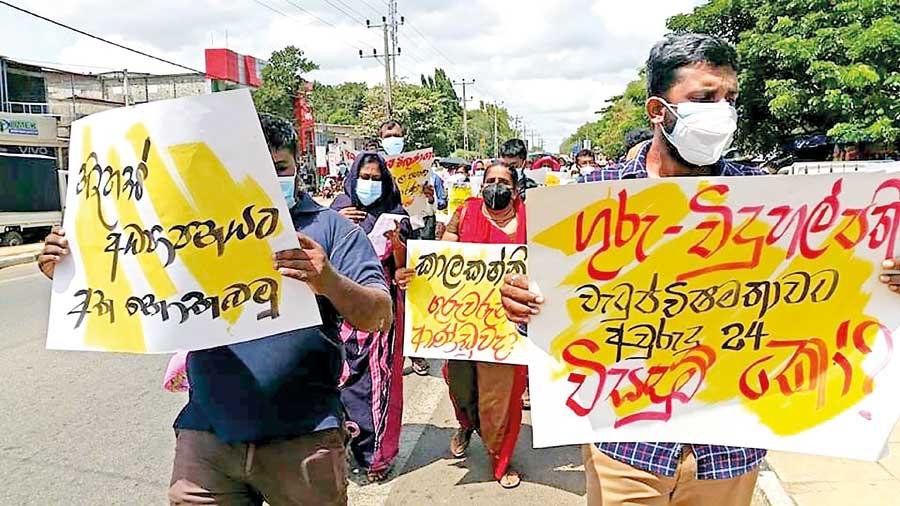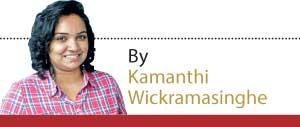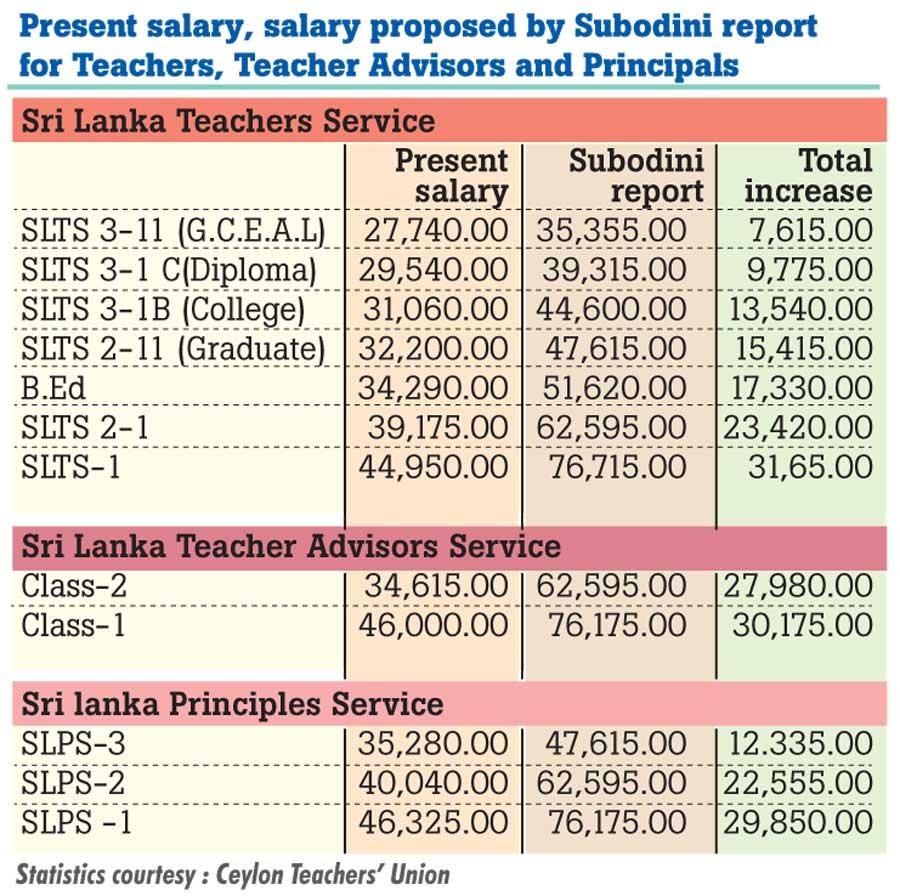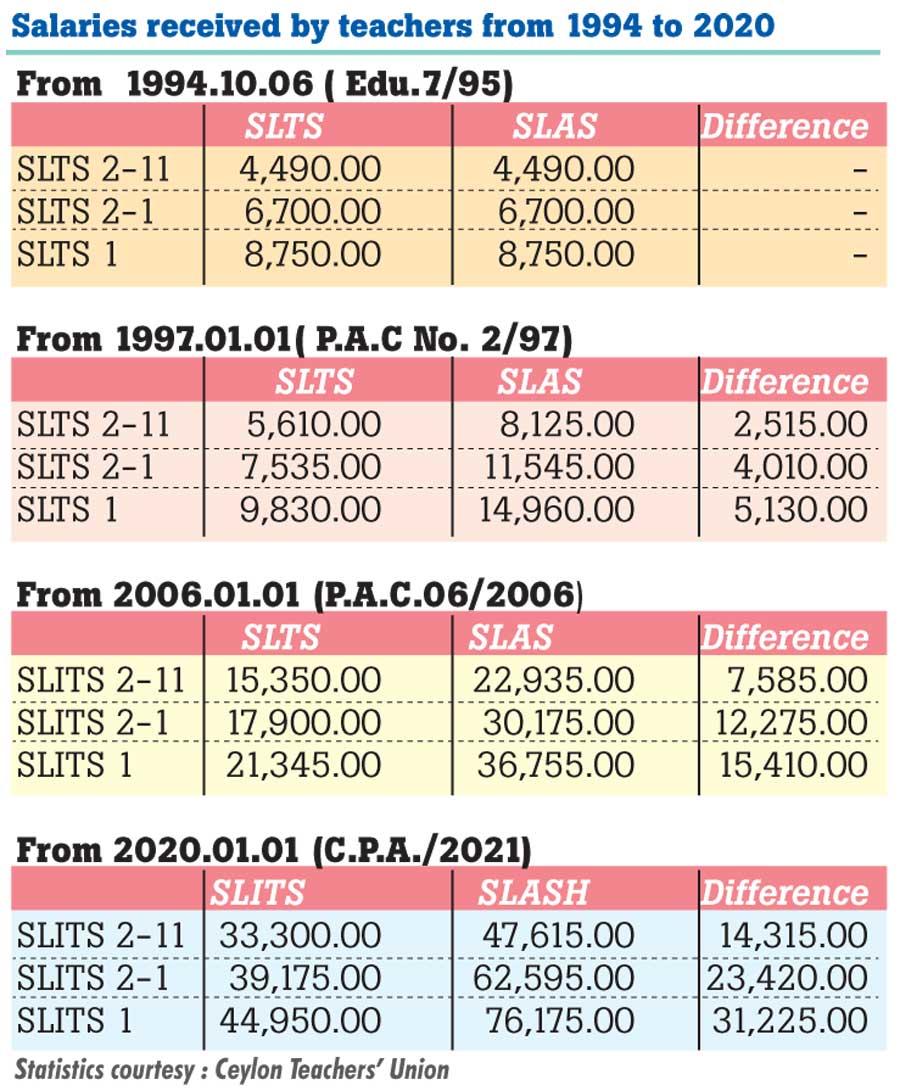06 Aug 2021 - {{hitsCtrl.values.hits}}
Teacher-Principal salary anomaly crisis

A tsunami of protests led by teachers and principals from around the island continued and they request the government to solve a salary anomaly issue that hasn’t been resolved for 24 years. Responding to protests the government promised to give a solution at a cabinet meeting held earlier this week but to the dismay of the teachers and principals the government announced that it doesn’t have the money to resolve the issue. A teacher is often acknowledged as a ‘second mother’ and one may question the pathetic plight of a teacher in Sri Lanka who had to finally take to the streets to demand the government to increase their salaries even after completing all higher educational qualifications and dedicating a greater part of their life to a much revered profession.
the government to solve a salary anomaly issue that hasn’t been resolved for 24 years. Responding to protests the government promised to give a solution at a cabinet meeting held earlier this week but to the dismay of the teachers and principals the government announced that it doesn’t have the money to resolve the issue. A teacher is often acknowledged as a ‘second mother’ and one may question the pathetic plight of a teacher in Sri Lanka who had to finally take to the streets to demand the government to increase their salaries even after completing all higher educational qualifications and dedicating a greater part of their life to a much revered profession.
Arrests unlawful
"The only component that was done from distance learning was online education, but that too wasn’t done properly. The government didn’t allocate a cent for it and everything was done by the teachers – Joseph Stalin"
44 individuals representing various teacher and principal unions were arrested following a protest that took place in front of the Presidential Secretariat on August 4. The teachers and principals were later produced at the Colombo Magistrate’s Court yesterday (August 5) and were released on bail. “These are unlawful arrests because these people were arrested once the protest was over,” opined Ceylon Teachers Union (CTU) President Joseph Stalin. “They were being detained by the Harbour Police. Police personnel from Maligawatta, Dematagoda and various other police stations were deployed to disperse the crowd. These incidents clearly show the undemocratic nature of governance implemented by the present regime. We will take every possible trade union action against these unlawful moves.”
When asked how the salary anomaly issue first came into being, Stalin said that teaching was established as a service in 1994 and as a result teachers and principals received pay hikes. “But in 1997 the B. C. Perera Salary Commission arrived at a notion that the formula to increase salaries for teachers and principals was errant. However, those engaged in other services got a 60% pay hike. According to Circular No. 297(3) the matter was held for later consideration but that consideration didn’t happen for 24 years. Thereafter we took various trade union actions. Then again in 2006 the Lionel Fernando and Saliya Mathew Commission arrived at the same conclusion made by the B.C. Perera Commission.”
“As a result we decided to boycott A/L paper marking and a case was filed by a student at the Supreme Court. In the final verdict, the Supreme Court rules (SC/FR287/2008) that teachers and principals be taken out of the General services category. But to date, that too hasn’t been done. In 2008 we met with the then Education Minister Susil Premajayantha and at the meeting it was decided that a sum of Rs. 6.7 billion was required to fix salary anomalies of teachers and principals. Subsequently the amount was brought down to Rs. 3 billion to increase the salaries by 45%. But no budgetary allocations were made with regard to this matter,” he added.
Stalin further said that in 2019 there were several cabinet papers addressing this matter and President’s manifesto itself mentioned that teaching would be made a ‘closed service’.“To date, none of these decisions or promises has been fulfilled. We staged our protests on par with the protests being held requesting the government to withdraw the Kotelawala National Defence University Bill. Since July 12 we have stopped conducting online classes for students. The only component that was done from distance learning was online education but that too wasn’t done properly. The government didn’t allocate a cent for it and everything was done by the teachers. It is only after one year and four months that they are talking about starting educational channels. We then met with Education Minister Prof. G. L. Pieris and Salary Commission was appointed where submitted our salary proposals and requested to make it a closed service.”
Grave injustice experienced by principals
“Some children come to school without breakfast, some children don’t bring books to school because they cannot afford. All these are covered by teachers but these factors haven’t been counted when calculating salaries of teachers or even principals for that matter” - Sugeeshwara Wimalaratne"
“To become a principal as per the Sri Lankan education system, one has to gather a lot of experience,” opined Professional Principals Association President, Sugeeshwara Wimalaratne. “In order to become a principal an individual has to serve for five years as a teacher and obtain a Degree in Education or serve five years as a teacher and have a basic degree and apart from that they should complete a Postgraduate Diploma in Education or complete a Diploma and serve seven years as a teacher. So far the total cadre of school principals island-wide is 16,512 but only around 11,000 of them are active at the moment.
The teacher-principal service has been under the same salary code in the administrative service until 1997 when the B.C. Perera Salary Commission raised questions about errant calculations. What we now request is to add these anomalies to our salaries. When the Subodhini Salary Commission was appointed with five executive members representing the Education Ministry we submitted a proposal with our requests. As such a principal in the Grade 1 category should receive Rs. 76,175. The salary for a Grade II principal was calculated at Rs. 62,595 but the actual amount is Rs. 64,890 and the salary calculation for a Grade III principal is Rs. 47,615 but the actual amount should be Rs. 57,798.”
Wimalaratne expressed concerns over categorizing principals in the same salary code that includes field officers, clerks and management assistants at government offices, those involved in paramedical services etc. “This is a grave injustice that we have faced. As such a principal is entitled to a salary of only Rs. 35,280 with all the educational qualifications we have to fulfill. It costs around Rs. 10,000 to stitch the white outfit that we have to wear; we need a good pair of shoes etc. When we talk about teachers they look after students with their own expenses. Some children come to school without breakfast, some children don’t bring books to school because they cannot afford. All these are covered by teachers but these factors haven’t been counted when calculating salaries of teachers or even principals for that matter.”
"What we have seen since the pandemic is the government was making proclamations about school openings and closing and holding exams and not holding exams, without addressing important policy issues such as introducing a curriculum for emergency situations - Dr. Sujata Gamage"
We are witnessing a deterioration of school education: Dr. Sujata Gamage
Continuing a struggle to bring about reforms in the education sector, Dr. Sujata Gamage, Senior Research Fellow at LIRNEasia and Co-Coordinator of Education Forum Sri Lanka says that one of the main reasons for teachers to receive step-motherly treatments by successive governments is due to deeply ingrained socio-political issues.
Q One of the main arguments for the ongoing struggle is that teachers have been underpaid for the longest time. Why do you think teachers (and their well-being) were neglected by governments? Is it a political motive? How could this issue have been resolved by successive governments? (In terms of special allowances, salary hikes etc.)
I am not conversant with the salary issues, but the reason that teachers have been underpaid, unrecognized and disrespected is due to deeply ingrained socio-political issues.
Teaching has gradually become a profession which is the last resort for the educated while administrative posts in government or positions of political power are hugely more lucrative and status boosting. In a climate where private interests override public interest, it is not surprising that the decision makers are interested in serving the interest of their professional class and their kith and kin.
A glaring example is the struggle by FUTA to increase spending for education to 6% of GDP, an unrealistic demand considering our total budget is less than 20% of the GDP. Anyway, the struggle was supported by a broad base of workers including teachers’’ unions, but the end result was a substantial increase in salaries for university staff and nothing for teachers.
How do you resolve the salary issue for teachers? Shut down state enterprises such as Sri Lankan which are causing billions of rupees losses per day (Rs.40 billion in 2019) bleeding the treasury and fund school education adequately and pay teachers and principals better salaries.
Q Have you observed a reduction in budgetary allocations for education over the past few years?
The budget for education has been steady at around 2% of the GDP over the last decade. As I noted later, this spending is skewed towards higher education and promises by the government to open more and more free-of-charge degree awarding opportunities is squeezing resources for school education. Another issue is that of the money allocated to primary or secondary education more than 95% is taken up by salaries and other personnel expenses. As the education sector is viewed by each succeeding government as places for employment of party supporters there is less and less money for anything other than buildings and bodies.
Q Schools were closed for more than a year in Sri Lanka and teachers claim that it was them who spent their own data charges and conducted online classes. The government didn’t implement any programme to provide e-learning opportunities for children. How do you see this?
What we have seen since the pandemic is the government was making proclamations about school openings and closing and holding exams and not holding exams, without addressing important policy issues such as introducing a curriculum for emergency situations, giving power to schools use a diversity of methods to reach out to each child without dictating terms from the center and reallocating funds to meet unforeseen costs and more importantly recognizing teachers for efforts they were making to reach out to the children and making some payment to show the appreciation. Instead teachers were sent one-size fit all circulars dictating how and when they should be teaching.
Q Since teachers have boycotted online classes, children are once again at the receiving end. What are the greater disadvantages children due to ongoing protests?
50% of children who were left out of online education are unaffected. Of those who were online many of them may have already turned off from zoom fatigue. I don’t see a big problem for children. Bigger problem is having frustrated teachers.
Q Why is Sri Lanka not keen to bring about reforms in the education sector and why is it necessary in this day and age?
If you go by stated intentions, the present government is keen to bring about reforms proposed in Saubhagya Dakma manifesto of President GR. The state Ministry of Education Reforms is promising to launch a pilot in 2023 with reduced examinations and reduced content in the curriculum. Unfortunately, I see very little chance of their efforts succeeding.
First, the attitude of the central government is all wrong. They cannot manage the present number of 300+ national schools but they want to take over more schools to increase the number to 1000 national schools. Essentially controlling about two thirds of the total enrollment in schools. This effort not only violates the intentions of the 13th Amendment which has devolved the subject of education to the provinces but also further centralization will worsen the present problems which are due to a ministry which should be doing policy and monitoring of policy implementation trying run 10,000+ schools from the centrally controlled school.
"If teachers aren’t given a satisfactory salary they will step down from their service. There needs to be talented teachers to mold talented children. The government needs to resolve this matter at least after a 24 year lapse
- Lionel Abeywickrama"
Secondly, our priorities are all wrong. Over the years we have diverted funds from school education to tertiary education. In 2004, the World Bank reported that “By international standards the average recurrent expenditure per student in Sri Lanka is modest at primary and secondary education levels but high at the tertiary education level. Further analysis is needed but over the years the funding for schooling has become more modest in comparison to higher education. To make matters worse, this government has promised to open city universities in each district when much needs to be done to improve our school education. The priority of the government should be to ensure every child gets an opportunity to complete 13 years of education with readiness to face the world. It is well established in economics that school education gives more public benefits than private benefits while the opposite is true for higher education. Once well prepared in quality school education, all that youth would need is a loan from the government to pursue whatever they want to pursue for a fee. It is said the Dr. Kannangara inserted including higher education to the “Education shall be free up to ...” at the last without weighing on the consequences. What we are witnessing today is deterioration of school education due to this haste in assuring free of charge higher education to all.
Fair solutions needed
Lionel Abeywickrama has served as a teacher for 24 years and is now the Principal at Hinguralakanda Maha Vidyalaya. “With 367 children are studying from Grades 1-13 this school is a ray of hope for students who cannot afford to study at the school in the town. Many of them come from less privileged backgrounds and teachers too are battling their own struggles. We need fair solutions at this hour. If teachers aren’t given a satisfactory salary they will step down from their service. There needs to be talented teachers to mold talented children. The government needs to resolve this matter at least after a 24 year lapse.”
Children won’t be inconvenienced from this crisis
Expressing his views on social media, a teacher from Kandy has stated that children will never be inconvenienced due to this crisis. “All lessons that have been missed will be covered in extra classes, holidays, weekends etc. To see our students succeed is the greatest joy in our lives.”
“We haven’t forced anyone to increase our salaries. We only request the government to add the salaries that have been deducted. If a student wants to be a teacher or a principal in future he/she would also want to be proud about their career like other careers. Some people in power, likened teachers to losers while another politician said that one teacher is enough to teach all students in Sri Lanka. To date, I respect and worship all myw teachers and they are like my own parents.”
"Some people in power, likened teachers to losers while another politician said that one teacher is enough to teach all students in Sri Lanka. To date, I respect and worship all my teachers and they are like my own parents
- Suren M. Rathnayaka (Teacher)"
“I chose this profession because I liked it and even during the COVID lockdown I enjoyed conducting classes to students despite certain disgusting acts by those in the same profession. It was the teachers who took the lead in conducting online classes, not because anybody forced us, but it was done with all the love we have towards our students. That too has been criticized by those in power and the process has been disrupted.”
Following protests a committee comprising officials from the Finance Ministry and the National Salaries/Pay Commission has been appointed by President’s Secretary Dr. P. B Jayasundara to look into matters relating to the education sector including the teacher-principal salary anomaly issue.
Several attempts to contact Education Ministry Secretary Prof. Kapila C. K. Perera proved futile.


26 Nov 2024 41 minute ago
26 Nov 2024 2 hours ago
26 Nov 2024 3 hours ago
26 Nov 2024 4 hours ago
26 Nov 2024 4 hours ago